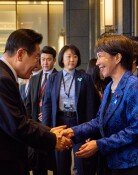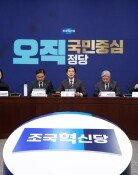[Editorial] Power elites behind Chung scandal must be named
[Editorial] Power elites behind Chung scandal must be named
Posted November. 02, 2000 14:53,
The crux of the matter in the public's suspicions over the Dongbang Mutual Savings and Finance's loan scandal is to determine whether or not political power elites and influential government bureaucrats were involved in the recent venture business loan scandal. As suspected, clues to dispel the suspicion are beginning to unfold as the stories about the private funds established by Chung Hyun-Joon, president of Korea Digital Line (KDL), are disclosed. The scenario here is becoming credible now to link power elites and influential bureaucrats with Chung in a symbiotic relationship for the unlawful loans. The story is that Chung courted them to invest in the 5 to 6 private funds he created by master-minding unlawful loans in tens of billion won.
The nucleus of scandal is the fact that some 10 prominent politicians and bureaucrats, according to confirmed reports, have invested in Chung's private funds. Included in them are the ruling Millennium Democratic Party (MDP)'s two influential legislative members known both as `K' and a MDP's elite member identified also as `K,' and a vice-ministerial ranking bureaucrat, known as `P.' The scandal, if authenticated, is sure to have politically megatonic detonative effects. It also points to the future focus of the investigations into the scandal. We are also anxious here to know if it has anything to do with the rumors that prices of shares and stocks were manipulated prior to the April 13 election in order to make political slush funds.
The MDP, of course, denies its members' investments in Chung's private funds. Prosecution authorities' official response on the issue is that they need more investigations to confirm their involvement in the controversial fund. Prosecutors' position here seems to indicate that they can disclose the list of such persons only when they ascertained full details about any unlawful agreements between Chung and them when they joined the private funds' membership. Understandably, prosecutors have some difficulty to immediately release the list of such persons since their fund membership in itself does not constitute an unlawful behavior.
Prosecutors must investigate whether Chung or his associates gave the stocks and shares to them free, or they exercised pressures on the Financial Supervisory Service on Chung's behalf in lieu of Chung's prior commitment to compensate any losses they may incur from the investments in his private funds. In view of Chung's behavioral pattern that has been thus far known to us, it is most probable that he courted them for his protective shield.
The fact that Chung has voluntarily submitted to the prosecutors the names of some people with his fund membership, can also be taken as a suggestive reference to some sort of roles the politicians played for Chung's business. Also feasible is the possibility that he aimed to influence the prosecution's investigations in his favor by tendering the names of political power elites.
Needless to say, prosecutors must focus on unlawful conducts of those power elites' fund membership. In view of their social status and influence, we think that prosecutors should not wait for the finding of their illegal conduct, but to immediately release, at least, some details about their circumstances of joining the funds, the origination and sources of their invested funds, and their full names. Otherwise, the general public's snowballing suspicions over the matter will not cease to stop.
The irony of the case is that the grass-roots have always been warned of the risks involved when they invest, but they must do it solely on their own responsibility. Yet, those power elites have indulged in making use of financial know-how in order to make profits in an easiest and safest way by the abuse of their social status.







